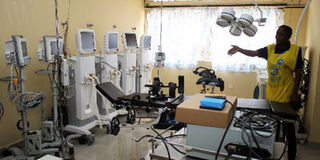Health financing needs multi-faceted approach

Martina Akinyi, Nurse in Charge of Siaya Hospital displays the new Intensive Care Unit and Renal Unit machines that the hospital has purchased on August 7, 2016. PHOTO | TONNY OMONDI | NATION MEDIA GROUP
What you need to know:
- In Kenya, health care is financed through taxes, external funding, household expenditure, the National Hospital Insurance Fund, and other private insurance arrangements.
- Government funding is inadequate and is considered an impartial mechanism for raising funds because individuals contribute according to their ability.
- Many sub-Saharan African countries are struggling to meet the high cost of medical care due to unreliable sources of health financing such as tax revenues.
While access to quality health care is a constitutional right in Kenya, millions of patients cannot afford to pay for health services. Many families rely on fund-raisers, family support, and loans. Some are obliged to deposit huge collateral securities in hospitals to access treatment.
In Kenya, health care is financed through taxes, external funding, household expenditure, the National Hospital Insurance Fund, and other private insurance arrangements. Government funding is inadequate and is considered an impartial mechanism for raising funds because individuals contribute according to their ability.
Many sub-Saharan African countries are struggling to meet the high cost of medical care due to unreliable sources of health financing such as tax revenues.
The economies of most of these countries are characterised by poor growth, huge national debts, and inflation, all of which affect allocations to the health sector. Although funds from development partners plug huge budgetary holes, they cannot be relied upon to support health care because they are not guaranteed beyond particular periods.
An article published in the International Journal for Equity in Health in May 2015 titled, ‘Catastrophic Health Expenditure and its Determinants in Kenya Slum Communities’, states that 60 to 80 per cent of urban residents live in informal settlements.
If we are to go by these statistics, then most of these people find it difficult to finance their health care. In fact, many Kenyans are unable to pay for their medical needs.
To reduce and hopefully eliminate this burden, Kenya should strive to adopt the Abuja Declaration. In April 2001, African heads of state gathered in Abuja, Nigeria, where they pledged to set a target of allocating at least 15 per cent of their annual budgets to the improvement of the health sector. This allocation, coupled with prudent management of funds, would contribute to health care for many households.
FINANCING SHEMES
In June 2015, the Ministry of Health launched two fundamental health care financing documents — the Kenya National Health Accounts (NHA 2012/13) and the Kenya Household Health Expenditure and Utilisation Survey (KHHEUS 2013).
According to NHA (2012/13), the total health expenditure in Kenya was Sh234 billion in 2012/13, up from Sh163 billion in 2009/10. During this period, revenues to support financing schemes came from the government, households, and development partners.
It is clear that effective health care provision requires a multi-sectoral approach, coordination, and focus. This calls for action by all key stakeholders, including the Health ministry, county governments, national health institutions, faith-based organisations, development partners, private sector, financing institutions, and NGOs and community-based organisations.
Since health care touches on everyone, the inclusion of all stakeholders is important because social factors that prevent many people from accessing affordable health care are as diverse as these groups.
Some faith-based organisations, for instance, are not profit-driven and play an important role in mitigating the high cost of health care for millions of patients.
There is, therefore, a need to adopt a multi-faceted approach when tackling the challenge of health care financing. For this to work well, it is vital to establish a common understanding of the critical issues involved and create a structured forum for consultations before key decisions and policies are made.
The ministry, which regulates, coordinates, and formulates policies on health matters, is best suited to coordinate and sustain a platform for regular consultation among the key stakeholders of health care financing.
The author is the managing director, Mission for Essential Drugs and Supplies. [email protected].




